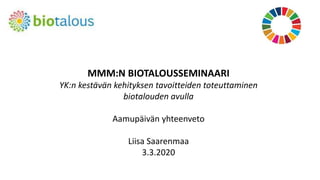Liisa Saarenmaan loppusanat mmm biotalousseminaarissa 03 03 2020.docx
- 1. MMM:N BIOTALOUSSEMINAARI YK:n kest├żv├żn kehityksen tavoitteiden toteuttaminen biotalouden avulla Aamup├żiv├żn yhteenveto Liisa Saarenmaa 3.3.2020
- 2. Hanns Carl von Carlowitz (24 December 1645 - 3 March 1714) was a German tax accountant and mining administrator. His book Sylvicultura oeconomica, oder hau├¤wirthliche Nachricht und Naturm├ż├¤ige Anweisung zur wilden Baum-Zucht (1713) was the first comprehensive treatise about forestry. He is considered to be the father of sustainable yield forestry. (L├żhde: Wikipedia) L├żhde: Suomen mets├żtilastot 2019. Luke
- 3. Kohti kest├żv├ż├ż kehityst├ż (Brundtlandin komissio 1987) Kest├żv├ż kehitys on kehityst├ż, joka tyydytt├ż├ż nykyhetken tarpeet viem├żtt├ż tulevilta sukupolvilta mahdollisuudet tyydytt├ż├ż omat tarpeensa. Kest├żv├ż kehitys edellytt├ż├ż, ett├ż yhteiskunnat tyydytt├żv├żt ihmisten tarpeet sek├ż kasvattamalla tuotantokyky├ż ett├ż turvaamalla kaikille tasavertaiset mahdollisuudet. Avaink├żsitteet: ŌĆó ŌĆØtarpeetŌĆØ etenkin maailman k├Čyhien perustarpeet, jotka on asetettava ehdottomalle etusijalle ŌĆó rajoitukset, joita nykyteknologia ja nykyiset yhteiskuntaj├żrjestelm├żt asettavat luonnon kyvylle tyydytt├ż├ż nykyp├żiv├żn ja tulevaisuuden tarpeet
- 4. Pakolliset toimenpiteet ŌĆó Kasvu on saatava elpym├ż├żn ŌĆó Kasvun laatua on muutettava (resurssitehokkuus; oikeudenmukaisuus) ŌĆó Kaikkien v├żltt├żm├żtt├Čmimm├żt tarpeet (ty├Čpaikka, ruoka, energia, vesi ja riitt├żv├ż hygienia) on tyydytett├żv├ż ŌĆó V├żest├Čnkasvu on pys├żytett├żv├ż kest├żv├żlle tasolle (syntyvyyden s├ż├żnn├Čstely kehitysmaissa, naisten koulutus ja terveydenhoito) ŌĆó Luonnonvaroja on suojeltava ja kehitett├żv├ż (luonnonsuojelu on moraalinen velvollisuutemme muuta el├żm├ż├ż ja tulevia sukupolvia kohtaan) ŌĆó Teknologian kehityssuuntaa on muutettava ja vaarat saatava hallintaan (tarvitaan teknologiaa, joka tuottaa yhteist├ż hyv├ż├ż; riskien hallinta; korvausvelvollisuus) ŌĆó Ymp├żrist├Č- ja talousn├żk├Čkohdat on nivottavat p├ż├żt├Čksenteossa yhteen (vastuuvelvollisuuttamme p├ż├żt├Čsten seuraamuksista laajennetaan)
- 5. REPORT OF THE UNITED NATIONS CONFERENCE ON ENVIRONMENT AND DEVELOPMENT* (Rio de Janeiro, 3-14 June 1992) Annex I RIO DECLARATION ON ENVIRONMENT AND DEVELOPMENT The United Nations Conference on Environment and Development, Having met at Rio de Janeiro from 3 to 14 June 1992, Reaffirming the Declaration of the United Nations Conference on the Human Environment, adopted at Stockholm on 16 June 1972, a/ and seeking to build upon it, With the goal of establishing a new and equitable global partnership through the creation of new levels of cooperation among States, key sectors of societies and people, Working towards international agreements which respect the interests of all and protect the integrity of the global environmental and developmental system, Recognizing the integral and interdependent nature of the Earth, our home, Proclaims that: Principle 1 Human beings are at the centre of concerns for sustainable development. They are entitled to a healthy and productive life in harmony with nature.
- 6. Second Ministerial Conference on the Protection of Forests in Europe 16-17 June 1993, Helsinki/Finland 1 RESOLUTION H1 General Guidelines for the Sustainable Management of Forests in Europe The Signatory States and the European Community, ŌĆ”. B. Recognising the non-legally binding authoritative statement of principles for a global consensus on the management, conservation and sustainable development of all types of forests, as adopted by the 1992 United Nations Conference on Environment and Development, hereafter referred to as the Statement of Forest Principles, C. Considering the objectives of sustainable management as stated in the Statement of Forest Principles: viz. ŌĆ£Forest resources and forest lands should be sustainably managed to meet the social, economic, ecological, cultural and spiritual human needs of present and future generationsŌĆØ, D. Agreeing that, for the purposes of this resolution, ŌĆ£sustainable managementŌĆØ means the stewardship and use of forests and forest lands in a way, and at a rate, that maintains their biodiversity, productivity, regeneration capacity, vitality and their potential to fulfil, now and in the future, relevant ecological, economic and social functions, at local, national, and global levels, and that does not cause damage to other ecosystems, E. Acknowledging the need when implementing policies for sustainable management to take account of potential impacts of climate change on forest ecosystems, ŌĆ”
- 9. Matti H├żyry MMM-biotaloustiimin kokous 15.1. 2020 ŌĆō Helsinki









